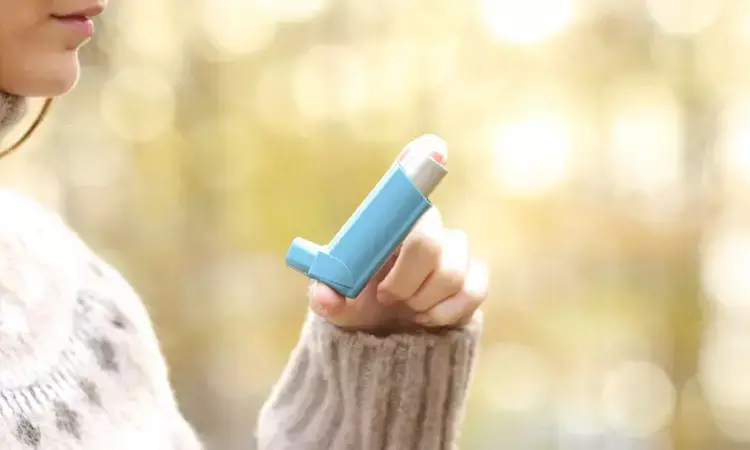- Home
- Medical news & Guidelines
- Anesthesiology
- Cardiology and CTVS
- Critical Care
- Dentistry
- Dermatology
- Diabetes and Endocrinology
- ENT
- Gastroenterology
- Medicine
- Nephrology
- Neurology
- Obstretics-Gynaecology
- Oncology
- Ophthalmology
- Orthopaedics
- Pediatrics-Neonatology
- Psychiatry
- Pulmonology
- Radiology
- Surgery
- Urology
- Laboratory Medicine
- Diet
- Nursing
- Paramedical
- Physiotherapy
- Health news
- Fact Check
- Bone Health Fact Check
- Brain Health Fact Check
- Cancer Related Fact Check
- Child Care Fact Check
- Dental and oral health fact check
- Diabetes and metabolic health fact check
- Diet and Nutrition Fact Check
- Eye and ENT Care Fact Check
- Fitness fact check
- Gut health fact check
- Heart health fact check
- Kidney health fact check
- Medical education fact check
- Men's health fact check
- Respiratory fact check
- Skin and hair care fact check
- Vaccine and Immunization fact check
- Women's health fact check
- AYUSH
- State News
- Andaman and Nicobar Islands
- Andhra Pradesh
- Arunachal Pradesh
- Assam
- Bihar
- Chandigarh
- Chattisgarh
- Dadra and Nagar Haveli
- Daman and Diu
- Delhi
- Goa
- Gujarat
- Haryana
- Himachal Pradesh
- Jammu & Kashmir
- Jharkhand
- Karnataka
- Kerala
- Ladakh
- Lakshadweep
- Madhya Pradesh
- Maharashtra
- Manipur
- Meghalaya
- Mizoram
- Nagaland
- Odisha
- Puducherry
- Punjab
- Rajasthan
- Sikkim
- Tamil Nadu
- Telangana
- Tripura
- Uttar Pradesh
- Uttrakhand
- West Bengal
- Medical Education
- Industry
Morning Timing of Spirometry exhibits greater Bronchodilator Responsiveness in Asthma, reveals study

A new study by Ben Knox-Brown and team showed that response to bronchodilators peaked in the morning and declined over the day, which may help guide asthma testing methods. Research shows that patients with asthma are more likely to exhibit bronchodilator responsiveness when spirometry testing is conducted in the morning rather than later in the day.
The findings of this study were published in the recent issue of BMJ Thorax journal.
Bronchodilator responsiveness, which is often defined as an improvement in forced expiratory volume in 1 second (FEV1) or forced vital capacity (FVC) following bronchodilator treatment, is a crucial diagnostic criteria for asthma. Asthma symptoms can vary throughout the day, and prior studies have indicated that a biological clock mechanism plays a significant role in the pathophysiology of the condition. It is unclear if the impact of diurnal fluctuation on bronchodilator responsiveness is limited to asthmatic individuals alone. Moreover, it is uncertain how seasonal fluctuation affects bronchial hyperreactivity. Thus, this study looked into how the season and time of day affected the bronchodilator responsiveness level.
The data from patients who were referred to Cambridge University Hospitals NHS Foundation Trust between January 1, 2016, and December 31, 2023, was examined retrospectively. The MasterScreen-PFT-Pro from Vyaire Medical was used to perform spirometry both before and 20 minutes after 400 µg of salbutamol was inhaled using a spacer and metered dosage inhaler. The impact of the time of day on the likelihood of a good bronchodilator response was examined using multivariable logistic regression analysis. Also, they looked at the impact of any interactions between the time of day and the reason for referral on the likelihood of a favorable bronchodilator response.
According to this study, the likelihood of experiencing bronchodilator responsiveness decreased by 8% for every hour that was added to the working day. The participants also showed lower probabilities of bronchodilator response in the afternoon when compared to the morning.
For individuals admitted for asthma or inquiry asthma, this connection remained positive. Also, it was not observed for those referred for other reasons. The research also discovered that the likelihood of a favorable bronchodilator response was significantly influenced by the time of day (per 1-hour increment) and the reason for referral.
The patients tested in the fall had a considerably reduced chance of having bronchodilator responsiveness than those tested in the winter, but only if they met the ATS/ERS 2005 criteria for bronchodilator responsiveness. Overall, spirometry testing conducted in the morning as opposed to later in the working day increases the likelihood that individuals with asthma or questionable asthma would exhibit bronchodilator reactivity.
Reference:
Knox-Brown, B., Kon, F. C., Sylvester, K. P., & Jha, A. (2025). Effect of time of day and seasonal variation on bronchodilator responsiveness: the SPIRO-TIMETRY study. Thorax, thorax-2024-222773. https://doi.org/10.1136/thorax-2024-222773
Neuroscience Masters graduate
Jacinthlyn Sylvia, a Neuroscience Master's graduate from Chennai has worked extensively in deciphering the neurobiology of cognition and motor control in aging. She also has spread-out exposure to Neurosurgery from her Bachelor’s. She is currently involved in active Neuro-Oncology research. She is an upcoming neuroscientist with a fiery passion for writing. Her news cover at Medical Dialogues feature recent discoveries and updates from the healthcare and biomedical research fields. She can be reached at editorial@medicaldialogues.in
Dr Kamal Kant Kohli-MBBS, DTCD- a chest specialist with more than 30 years of practice and a flair for writing clinical articles, Dr Kamal Kant Kohli joined Medical Dialogues as a Chief Editor of Medical News. Besides writing articles, as an editor, he proofreads and verifies all the medical content published on Medical Dialogues including those coming from journals, studies,medical conferences,guidelines etc. Email: drkohli@medicaldialogues.in. Contact no. 011-43720751


